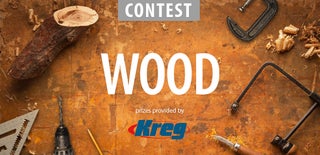Introduction: Pallet Wood Dining Table
So I was looking for an outdoor dining table but because I'm strange, I can't just buy one off the shelf. Besides, it's more fun to make one myself anyway.
I had this crazy thought about using pallet wood pieces but as usual, the thought and the execution did not go hand in hand.
Step 1: Make It Work
After visiting the nearby pallet wood rehabber guy, Twitchy (my pet name for him), I came home and assembled all the pieces upside down. The gap in the middle was for a planter, ya know, for that fill-it-with-ice, keep-items-cold idea.
Once I had all the pieces arranged, I thought huh. Well. Now how the heck am I gonna do this. Great. An idea with no solution!
Step 2: Researching
It wasn't until I found DAP's Weldwood Plastic Resin Glue that I was finally able to make this whack-a-doo idea come to fruition.
Bar top resin was the obvious route but a.) it doesn't work in the reverse i.e. build a mould, add the pieces, pour, pop out, 2.) it's not UV and weather resistant, and c.) I'd need like four hundred bucks worth (nope). You can read all the details about what I was finding over on my blog, Flipping the Flip, by clicking the link in the sidebar.
Step 3: Mix It Up
I mixed up the glue. Darn if it wasn't super runny mixed using the instructions. Well, gotta give it a shot. (Later I did mix it differently to thicken it up.)
Step 4: Make It Work
So I skooched the pieces apart, dabbled on some glue, pushed them back together (no clamps). Then after all the sides had glue on them, I poured the remaining in the joints where I could. Held my breath, walked away slowly, and waited.
Step 5: Wow
The next day I lifted the half of table I glued and it all came up as one piece. Holy cats and dogs. The glue worked! What an amazing glue! Although, it did seep through to the front side. That was a big bummer.
Step 6: Keep Working
Countless hours of chipping and scraping the glue off the face with a chisel later, I had to go back and re-glue several areas. I crammed some shims in as necessary, and yeah, used a bit of Gorilla glue here and there but it all worked.
Step 7: Leg It
I had won a Pretty Pegs gift certificate from a previous Instructables project (thank you!!) so I used them for this. Yes, they are indoor legs but I sealed them up with several coats of spar outdoor polyurethane. Magically the brackets fit in perfectly.
Step 8: Although...
Although then the table was wiggly. I suspect it's a combination of a not-solid-throughout top and the legs too close together. So I added some longer pallet wood slats underneath to frame it up, sturdy it up. It helped but not completely.
Step 9: Inpection
It passed.
Step 10: Seal It Up
Final step was to seal the table top with several coats of an outdoor poly. It bought out the details and grain of the wood, the saw-burnt edges of some of the pieces -- it was crazy amazing.
Step 11: Move Outdoors
It's done! Yes it's scratchy, yes it's a bit dangerous, yes there are rusty nail bits and holes and gaps and rough edges but we're grown ups. Plus, that's how I like it. Take the idea and run with it, adapt it to how you see fit.
Come see all the details about this and many other spiffy projects over on my blog!

Participated in the
Backyard Contest 2016

Participated in the
Outside Contest 2016

Participated in the
Wood Contest 2016













